As you think of career paths and your love of animals you may wonder how to become a veterinarian. Veterinarians are instrumental in helping animals live happy and healthy lives.
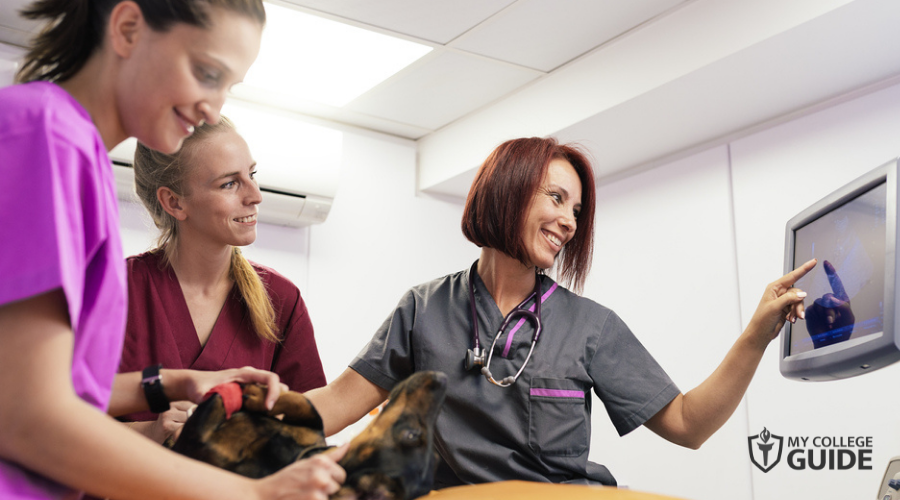
Veterinarians work to diagnose and treat animals, including family pets, livestock, and more.
Editorial Listing ShortCode:
If you love animals and want to use that passion for the greater good, a veterinarian degree may be a good choice for you.
How to Become a Veterinarian

If you have dreamed of becoming a vet since childhood, you can start preparing for your career path early in your education. Veterinarian schooling can begin as early as high school.
Editorial Listing ShortCode:
For many professional veterinarians, the path to becoming a vet looks something like this:
- Gain First-Hand Knowledge: Practical experience in veterinary medicine can be helpful throughout your education. Internships and job shadowing are fantastic ways to have hands-on experience in veterinary medicine as you build your skills at school.
- Choose an Undergraduate Degree in a Related Field: Finding a pre-vet medicine undergraduate degree isn’t entirely necessary, but related fields such as biology, chemistry, or math. Within your major, optimize your education by taking classes that focus on animal health and behavior.
- Receive Your DVM Degree: It’s important to select a doctor of veterinary medicine (DVM) program that reflects your desired specialty in animal medicine. Most DVM programs take about four years to complete and have both educational and fieldwork requirements.
- Pass the North American Veterinary Licensing Examination (NAVLE): Many students sit for this exam during or just after their senior year of vet school. Receiving this license is essential to practice veterinary medicine in the United States.
- Complete Necessary Licensing to Practice: In addition to the NAVLE, some states require additional licensing, which is required in order to start practicing as a vet.
- Pursue Continuous Educational Opportunities: As research and technology continue to develop, new outcomes and therapeutic methods are discovered. Veterinarians are encouraged to continue studying the latest findings in their field.
Depending on your overall professional goals, you may wish to become certified in a particular specialization. Many veterinarians conduct and publish their own research, as well, as they continue to grow within their practice or field.
3 Things You Can Do as a Veterinarian
Many professionals choose certain areas of study as they are completing their veterinarian schooling in order to be prepared for their ideal career. These can include the following three careers among many others.
1. Surgeon
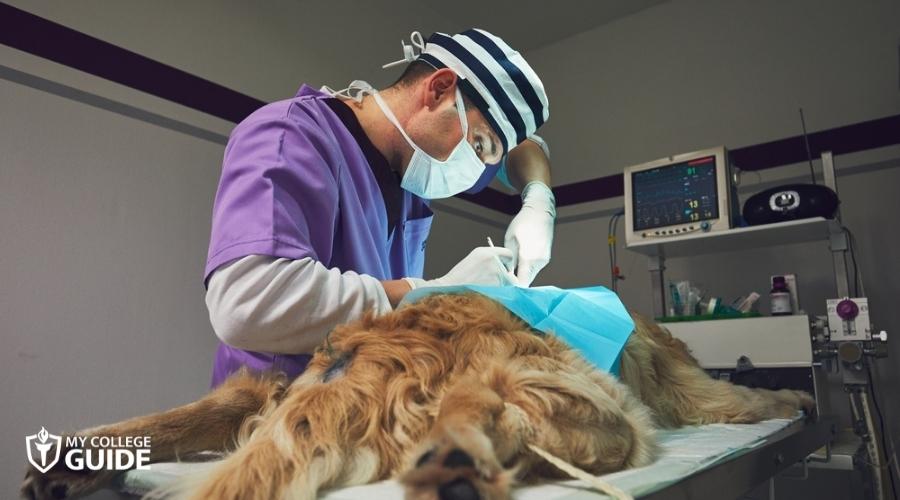
Some students choose to concentrate on surgical practices. These students generally select between orthopedic– bone and joint surgery– and soft tissue surgery, which includes organs, muscles, and other tissue.
Many veterinary surgeons also focus on a certain species of animal in order to develop their expertise.
2. Theriogenologist

This is the science of animal reproduction. While animals are generally capable of reproducing without human intervention, there is much research into this field to understand animal genetics and traits.
Selective breeding can assist in reducing health risks and increasing desired traits to help a species thrive. These specialists review bloodlines and examine specific animals for breeding suitability.
3. General Practice

Most people are familiar with a general practice or “family” veterinarian who takes care of their pets and service animals.
Editorial Listing ShortCode:
A general practitioner typically sees a certain type of animal, including small animals (cats and dogs), livestock, equine, avian, or exotic animals. These vets conduct thorough physical exams and may provide vaccinations, treat injuries and illness, and prescribe medication to boost an animal’s health.
Veterinary Medicine Specialties
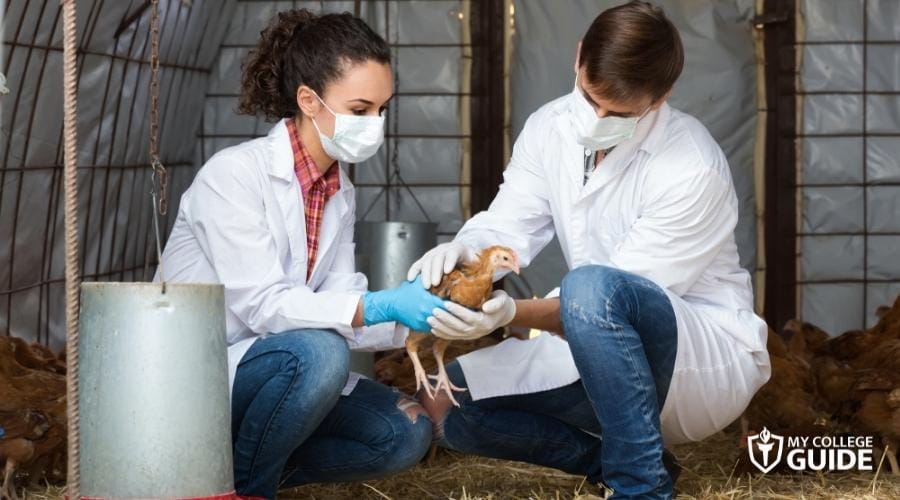
As a prospective veterinarian, you’ll be asked to choose from one of the many specialties recognized by The American Board of Veterinary Specialties (ABVS).
Among the 22 organizations and 41 specialties recognized by the ABVS are:
- Animal Welfare: This specialty involves examining, treating, and observing animals who are victims of neglect or cruelty.
- Dentistry: In this specialty, students focus on the care, repair, and surgical intervention of animals’ teeth and mouths.
- Emergency and Critical Care: This specialty allows students to focus on urgent and immediate care for animals experiencing sudden trauma or disease.
- Internal Medicine: Within this specialty are the fields of cardiology, neurology, and oncology, allowing students to focus on a very centralized area of concern within an ailing animal.
- Poultry: This specialty focuses on the medical needs of chickens, turkeys, and ducks, often in a farming or production facility type of setting.
- Zoo Medicine: In this specialty, you’ll get up close and personal with the animals in a zoo or conservation type of setting.
- Sports Medicine and Rehabilitation: This specialty allows vets to concentrate on an animal’s structural wellness, movement, and soundness, developing plans for recovery after trauma or surgery.
- Animal Behaviorist: These specialists strive to understand why an animal acts the way it does, as well as implement interventions for everyone’s safety.
Choosing a specialty as part of your DVM degree can help you gain the education needed for veterinarian practice once you have graduated.
Veterinary Careers & Salaries
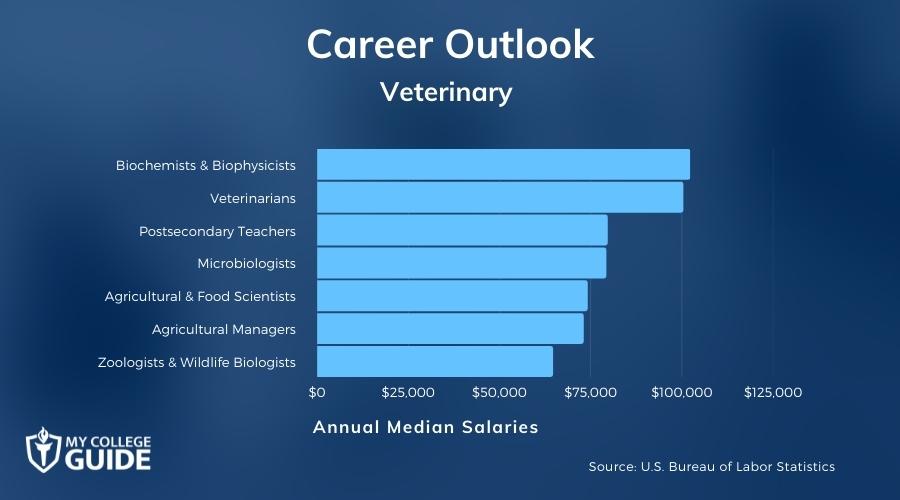
Beyond practicing veterinary medicine, those who have veterinarian schooling frequently work in scientific research, conservation, and laboratory settings to promote animal health and well-being in each setting.
According to the Bureau of Labor Statistics, career opportunities for veterinarians are anticipated to grow by 19% over the next 10 years.
| Careers | Annual Median Salaries |
| Biochemists and Biophysicists | $102,270 |
| Veterinarians | $100,370 |
| Postsecondary Teachers | $79,640 |
| Microbiologists | $79,260 |
| Agricultural and Food Scientists | $74,160 |
| Farmers, Ranchers, and Other Agricultural Managers | $73,060 |
| Zoologists and Wildlife Biologists | $64,650 |
| Conservation Scientists and Foresters | $63,750 |
| Veterinary Assistants and Laboratory Animal Caretakers | $29,780 |
| Animal Care and Service Workers | $28,730 |
Earning a DVM degree can provide you with the education needed to branch out in a variety of fields related to animals and their well-being.
How to Choose a Vet School

There are many DVM degree programs offered, which means you may want to closely examine offerings to ensure they meet your needs as a student.
As you research the various vet schools, ask yourself the following questions:
- What specializations or concentrations can you pursue? You’ll want to select a school that allows you to focus on your chosen area of expertise. Look for a curriculum structured around a specialization that interests you.
- Can you afford tuition? It’s a good idea to be realistic about what you can pay for your education, though many financial assistance opportunities can be available.
- What internship or field learning opportunities are required and offered? Hands-on education is a critical part of how to be a vet. How many hours of experience are required, and does the school connect students with opportunities through a teaching hospital or internal program?
- What are the requirements for graduation? Are courses offered online, in person, or a mixture of the two? What are other prerequisites for successful completion? Make sure a program is suitable to your education style before enrolling.
There are many veterinarian schooling opportunities, so carefully review each to ensure you select a program that’s a good fit for you.
Accreditation

When selecting a veterinary school, you may wish to concentrate on those which are accredited through CHEA, or the Council for Higher Education Accreditation.
Editorial Listing ShortCode:
Schools that have received CHEA accreditation have been reviewed for their educational excellence. As a result, there are several benefits to selecting an accredited school. In many cases, licensing agencies and boards require proof that students received their degrees from an accredited institution. Professional organizations may have similar membership requirements.
Programmatic Accreditation for Veterinary Medicine Programs
The programmatic accrediting organization for veterinary medical programs is the American Veterinary Medical Association, Council on Education (AVMA-COE).
The United States Department of Education (USDE) recognizes the AVMA-COE as the accrediting body for veterinary medical education programs. Receiving AVMA-COE accreditation indicates a program has met very stringent educational standards in the industry.
In order to be eligible for licensing and veterinary medicine certifications, students are required to graduate from a program that has received AVMA-COE accreditation.
Is Financial Aid Available?

Students who wish to determine if they are eligible for need-based financial assistance may start by completing the FAFSA, or Free Application for Federal Student Aid.
Scholarships are often available at all stages of veterinarian schooling. Undergraduate students may qualify for scholarships based on previous academic performance. Additionally, many DVM degree programs offer financial aid and grants for students depending on their specialization and course of study. Academic scholarships are also frequently offered.
What Does a Veterinarian Do?

The main goal of every veterinarian is to promote the wellness of the animal population, but there are many different ways to do so.
Some vets establish their own general or surgical practice, based on their area of specialization and expertise. Many choose to work in a research field by providing wellness checks for laboratory animals or conducting their own studies to advance medical knowledge.
Others who have received veterinary schooling work in conjunction with national parks, zoos, or conservation organizations to attend to threatened animal populations, which adds to the veterinary profession’s diversity.
What Major Do You Need to Be a Veterinarian?
While some undergraduate schools offer a pre-veterinary program for Bachelor of Science candidates, students may wish to select a more generalized major in order to keep their options open, especially given the number of veterinary specializations offered.
Editorial Listing ShortCode:
Common undergraduate majors among those learning how to be a vet include biology, animal science, microbiology, and chemistry. As you take steps to become a veterinarian, you may start looking at veterinary school requirements to ensure you meet these prerequisites.
What Are the Educational Requirements to Become a Veterinarian?

In order to be a vet, there are several areas in which a student may need to demonstrate proficiency, including:
- A solid background in microbiology, biology, and math. Many DVM degree programs require a certain number of lab and classroom hours in these subjects.
- Real-life experience. It is widely considered very important to gain field experience throughout your education.
- Receiving a Doctor of Veterinary Medicine degree. Earning your degree makes you eligible for the North American Veterinary Licensing Examination (NAVLE).
Veterinary schooling can begin as early as your undergraduate studies to prepare you for the DVM degree program.
What Qualifications Do You Need to Be a Veterinarian?
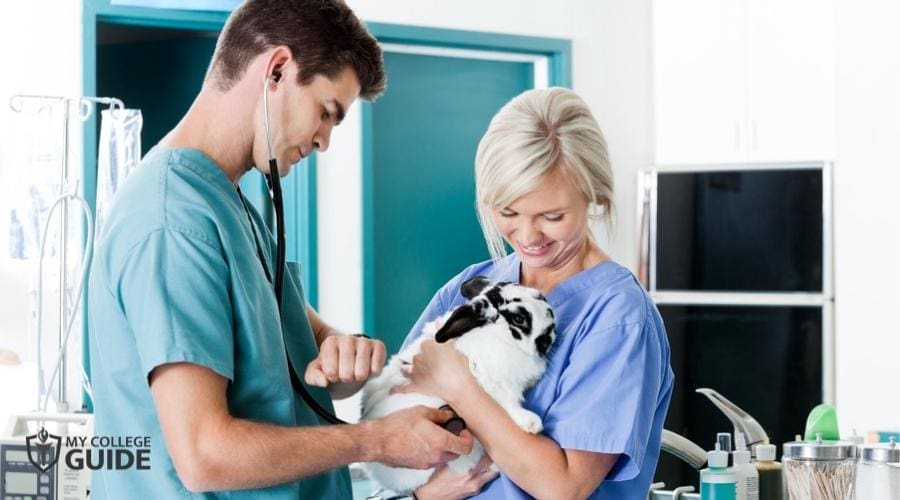
You may be asked to receive additional certification from the American Veterinary Medicine Association (AVMA) college overseeing your specialty. Two common certifications include the following:
- American Board of Veterinary Practitioners (ABVP): Veterinarians who have this certification have shown they have the knowledge and expertise to establish their own practice.
- American College of Veterinary Ophthalmologists (ACVO): Once certified by the ACVO, you are considered a Diplomate of the American College of Veterinary Ophthalmologists (DACVO). This certification is important for graduates who wish to care for the eyesight of animals.
One or more colleges may be appropriate for membership, depending on the type of practice or field you choose for your career path.
Where Do Veterinarians Work?
Many people associate veterinarians with a private practice, and that is a very popular choice for many who have learned how to be a vet.
Other options include working in:
- Zoo
- Animal conservancy
- Shelter or humane organization
- Laboratory
- Farms and food production facilities
- National parks or other wildlife areas
In addition to caring for and treating animals, veterinarians are also able to help study animals, procure tissue and blood samples for research, and make recommendations for habitat and feeding options.
How Much Do Veterinarians Make?

A trained veterinarian’s salary can depend on many factors, including their chosen career path, level of experience, and geographical area in which they work.
According to the BLS, the average salary for veterinarians in the United States is $100,370, which includes all specialties and practice types. A practicing vet may earn more or less annually, depending on their specialty and type of practice.
Editorial Listing ShortCode:
Researchers may also earn a range of salaries, with zoologists and wildlife biologists earning a median of $64,650 and biochemists and biophysicists earning $102,270.
How Long Does It Take to Become a Veterinarian?

The length of time it takes to become a veterinarian often depends on the steps you take to become a veterinarian. Selecting an undergraduate program that prepares you for a DVM degree is the most direct path, requiring 4 years of schooling for your undergrad degree and 4 years for your DVM.
Some students may take additional undergraduate-level courses to become eligible for enrollment in a DVM program, which typically increases the amount of time it takes. Additionally, some AVMA certifications have their own education and experience requirements which may extend beyond traditional schooling.
Is Becoming a Vet Worth It?
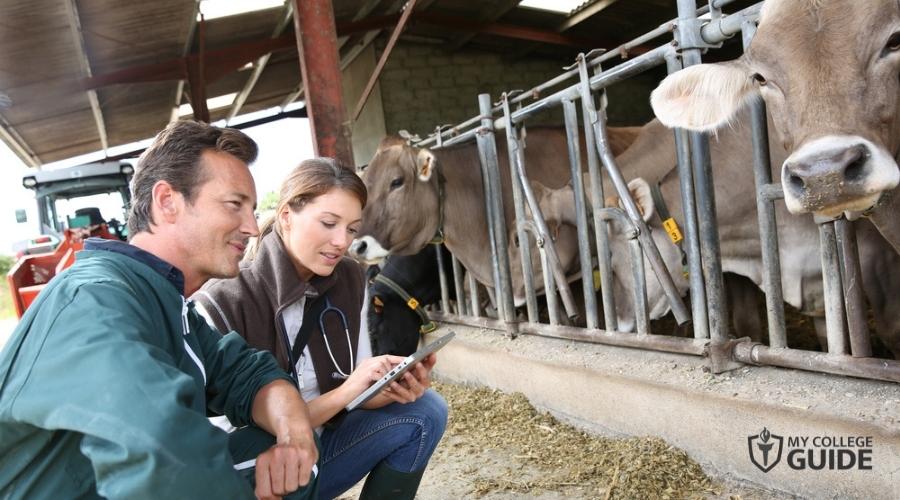
Yes, becoming a vet is worth it for many professionals. Animals are a very important part of our world, as pets, sources of nutrition, and part of the ecology that makes our planet special.
As a veterinarian, you’ll be tasked with prioritizing the care of animals for a variety of reasons, whether conservation of a species, breeding for optimized health, or keeping a child’s first pet properly vaccinated. Whether you pursue a career in which you work with animals directly or select a path in education or research, your skills as a veterinarian can benefit many animals and humans alike.
Getting Your Veterinary Degree Online

If you are drawn toward providing care and promoting the wellness of animals of any shape, size, or species, you may wish to consider earning your veterinary degree online. It’s never too early to plan for this exciting career path.
Take a look at some of the accredited programs offered that can provide you with steps to becoming a veterinarian and insight into a specialty that suits you and your career goals.
Animals are a special part of many peoples’ lives, and important to the future of our planet. With your veterinary degree, you can help our pets, agriculture, and environment thrive!
